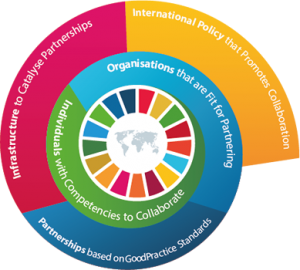Building the collaborative world we need to deliver the SDGs
Posted by Breggie Hoffman on 12 August 2022, 13:15 SAST


By Darian Stibbe, Executive Director of The Partnering Initiative
For collaboration to contribute at scale to the SDGs, significant investment in the overall enabling infrastructure, capacity and environment for partnering is required.
Collaboration across societal sectors has emerged as one of the defining concepts of international development in the 21st Century. Initially a response to the limitations of traditional state-led, aid-funded, top-down linear development approaches, partnership has grown to become an essential paradigm in sustainable development: its importance has been recognised fully both by business and by all of the leading institutions in the international development field, and embedded within the 2030 Sustainable Development Goals (SDGs) – the blueprint for global development.
The SDGs explicitly acknowledge the interconnectedness of the prosperity of business, of society and of the environment. They represent a fundamental shift, naming all societal sectors as key development actors, and requiring an unprecedented level of cooperation and collaboration among civil society, business, government, NGOs, foundations and others for their achievement.
TPI’s vision is a new era of systematic, complex collaboration that delivers the SDGs.
It is a world in which business becomes a full partner in development working alongside states, NGOs, international agencies and academia; in which collaboration between diverse organisations is the norm rather than the exception; in which all sectors of society appreciate the interconnectedness of their interests and actively seek to align, leverage and combine their energies, resources and investments wherever value can be created; in which the Sustainable Development Goals are not just an aspiration but a real, practical focus for development – development based on innovative and transformative partnerships.
While large-scale international partnerships will continue to play a role, we need a whole range of different forms of collaboration, from those that catalyse financial investment by business to more holistic, multiple-issue partnerships at the country or local level that can address the complexity of interlinked goals. This need characterises a new era in multi-stakeholder collaboration: an era of complex partnering.
Turning the rhetoric into reality
Cooperation across societal sectors, however, is difficult. There are a myriad of challenges from the political to the institutional to the individual that stand in its way.
For partnerships to achieve their full potential, the following ‘building blocks’ need to be in place:
- Policy: There is strong awareness and supportive international and national policies are in place to enable governments to collaborate with business and other actors as partners in development;
- Infrastructure: An ‘infrastructure’ is in place that can systematically convene the different societal sectors around key issues and catalyse innovative partnership action, in particular at country and local levels;
- Partnerships: Partnerships follow good practice around process, transparency, setup and management to maximise their quality and impact and ensure they deliver impact and added value to all;
- Organisations: Organisations of all kinds are ‘fit for partnering’ i.e. they have the right leadership and strategy, systems and processes, staff competencies and support, and outwards-looking culture to partner with excellence;
- Individuals: Individuals have the essential competencies to partner with excellence: partnering mindset, understanding of other sectors, human relationship and trust-building skills, and technical knowledge.
While efforts in all these areas are ongoing by TPI and a variety of other organisations, we need to magnify those efforts through cohesion, collaboration and investment to be able to create scale of impact.
Shifting towards a collaborative society will not happen by chance and instead requires a deliberate, concerted and targeted effort to help make it happen. And with the clock ticking quickly towards 2030, there is no time to lose.
Acces this blog, dated 16 January 2018, on The Partnering Initiative's website: Click here

 .
.